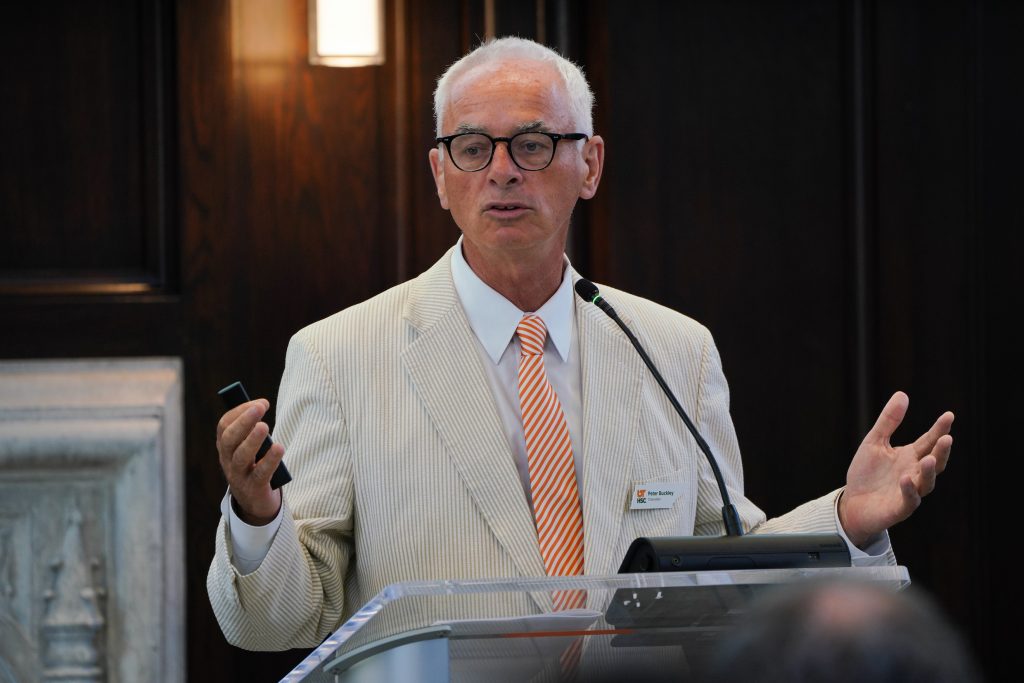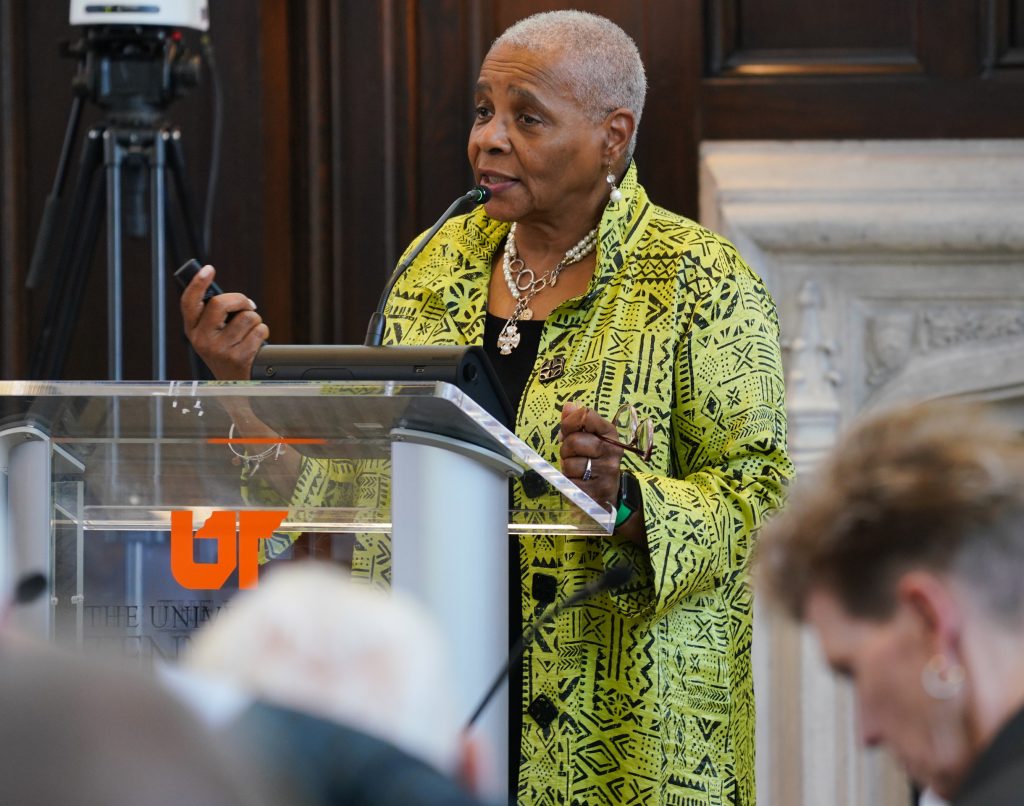
Impressed by the current momentum and direction of the University of Tennessee Health Science Center, members of the UT Board of Trustees today unanimously approved UTHSC’s new 2023-2028 Strategic Plan, setting the university on an exciting trajectory for the future.
The comprehensive roadmap for UTHSC’s next five years was developed under the leadership of Cindy Russell, PhD, vice chancellor for Academic, Faculty, and Student Affairs, in a planning process that spanned more than 18 months and included 700 faculty, staff, students, and community members.
“We are most grateful to our leader, Dr. Cindy Russell, and to so many colleagues for a remarkable job,” UTHSC Chancellor Peter Buckley, MD, told the board. “Our strategic plan is a balance of inspiration, perspiration, aspirational activities, and foundational activities.”
The long-term collaborative process defined UTHSC’s inspirational new vision in four words: Healthy Tennesseans. Thriving Communities.
The plan centers on five strategic pillars: Engaging Communities, Educational Excellence, Expanding Research, Advancing Health, and Developing Talent. The pillars rest on a new, streamlined mission statement and encompass values that reflect the UT System’s Be One UT values with added focus on the health sciences.
The new mission statement streamlines UTHSC’s previous mission statement, but retains its long-standing academic, clinical, research, and outreach focus. UTHSC’s new mission statement reads: “Transforming lives through collaborative and inclusive education, research/scholarship, clinical care, and public service.”
UTHSC’s new values mesh with the UT System’s Be One UT Values, which are: Bold and Impactful, Embrace Diversity, Optimistic and Visionary, Nimble and Innovative, Excel in All We Do, United and Connected, Transparent and Trusted. Additionally, UTHSC’s values are Health Focused, Science Driven, Caring and Professional.
The strategic plan establishes UTHSC’s commitment to the goals of strengthening partnerships to engage communities; promoting quality interprofessional education; growing research, innovation, and entrepreneurship; expanding quality care across Tennessee; and creating an environment of success for all.
Each of the strategic pillars is supported by five foundational priority areas that apply across them all. These are campus culture and work environment; communications; data and data governance; diversity, equity, inclusion; and philanthropy.
Performance indicators have been designed to measure visible progress. Additionally, the strategic plan will also provide a point of reference and instructional support for upcoming UTHSC strategic planning in the individual colleges.
Chancellor Buckley said, the plan “is building a solid foundation into an exciting future.”
The Board of Trustees, which arrived at UTHSC Thursday, learned about the exciting new developments at the university, including the addition of impressive new leaders, Paul Wesolowski, MBA, vice chancellor for Strategic Partnerships; Brigitte Grant, MBA, vice chancellor for Advancement; and Reginald Frye, PharmD, PhD, dean of the College of Pharmacy. The members also were reminded of UTHSC’s legacy of outstanding leaders, including Ken Brown, JD, MPA, PhD, former executive vice chancellor and chief operations officer who retired in March after 25 years; and Tony Ferrara, CPA, MAS, senior vice chancellor for Finance and chief financial officer, who leaves the university in August after 18 years.
Thursday evening, the board had the opportunity to visit the new $45 million Delta Dental of Tennessee Building that opened in April and honors the outstanding support from Delta Dental of Tennessee and its Chief Executive Officer Philip Wenk, DDS, a graduate of the University of Tennessee, Knoxville; the immediate past chair of the UT Foundation Board of Directors; chair of the UTHSC Advisory Board; and an alumnus of the College of Dentistry. During a dinner, Ted Townsend, president and chief executive officer of the Greater Memphis Chamber, spoke about UTHSC’s impact on health care and its role as a major contributor to the economy of Memphis. He said UTHSC is a growing and welcome presence in the Memphis community and a vital partner.
UT System President Randy Boyd addressed UTHSC’s presence in Memphis and across Tennessee, referencing UTHSC’s slogan: “Memphis is our Home, Tennessee is our Campus.” UTHSC enjoys strong statewide partnerships with teaching hospitals in Memphis, Knoxville, Nashville, Chattanooga, and Jackson. UTHSC remains the largest educator of health care professionals in the state and has more than 880 educational and clinical training sites across Tennessee.
Memphis partners Michael Ugwueke, MPH, DHA, FACHE, president and CEO of Methodist Le Bonheur Healthcare, and Reginald Coopwood, MD, president and CEO of Regional One Health, were also recognized for their leadership and vital partnerships.
Earlier Thursday, Altha Stewart, MD, senior associate dean for Community Health Engagement in the College of Medicine and director of the Center for Youth Advocacy and Well-Being at UTHSC, gave board members of the Education, Research, and Service Committee a compelling account of work being done by the center.

The full board meeting today began with an invocation by Shelby County Commissioner Charlie Caswell, a pastor at Impact Baptist Church. Among the many items covered during the productive meeting, the board also ratified an innovative joint nursing program with UT Southern, a 1.5% increase in tuition for UTHSC students, and multi-year contracts for faculty.
President John Compton thanked UTHSC for hosting the gathering and praised UTHSC for the outstanding achievements since Chancellor Buckley began his tenure in February 2022. “It is impressive what you have done to pull your team together,” Compton said. “Your leadership here will have a lasting impact.”
